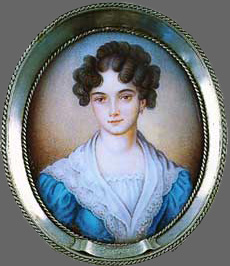|
|
The russian folk art |
 |
|
French version
|

|
"As for
Marya Raevsky, a small, lively, mischievous, graceful brunette:
Some say she was the secret passion of his life. Marya, however,
who Carried the Decembrist leader Prince Volkonsky in 1825,
firmly denied that Pushkin had ever felt anything but friendship
for her. "As a poet," she said, "Pushkin felt
obliged to fall in love with every pretty woman and every girl
he met. In reality, he was in love with his muse, and transposed
everything he saw into poetry!"»
Pushkin himself wrote: "I have been more or less in love
with every pretty woman I have ever met. All of them have laughed at me.
All, except one, played the flirt with me."
|
|
|

N.Kulandine. "The portrat of Marya Volkonsky"
1983 Rostov enamel
|
|
DEDICATION
This is for you - but will the rhythm
Of this dark music touch your ear?
And will your modest nature fathom
My heart's unruly striving here?
Or will the poet's bold submission
Of verse, as once of love, again
Pass by without your recognition,
As unacknowledged now as then?
Know it again, at least, the rhyme
That once, I think, was dear to you -
And know that since that parting chime,
Whatever changing fate I knew,
The memory of words last spoken
By you, and your sad wilderness,
Have been my only sacred token,
Sole refuge, ultimate redress.
A.Pushkine. "Poltava". 1828
|
|
All except
one: Perhaps he was thinking of Marya?
Leaving aside the question of an exclusive passion, Pushkin
must certainly have been attracted by this child who was unfolding
and becoming Woman before his eyes. But the more genuine his affection, the
more reticent his approach. He might pose as a Don Juan in front
of less virtuous creatures, but he became tongue-tied in the presence of
someone he sincerely respected. He said nothing to Marya; or if he did,
she did not understand him. Too young, perhaps; in those days she was still
in the care of her English governess and her nanny, and her ideas did
not extend beyond climbing the steep mountain path or dabbling her
feet in the waves.
But later? No letter or document has survived to
reveal the destiny of this unshared love; Pushkin's works alone attest
to its strength and persistence. From this period date his first poems on the
theme of the unknown, adorable and irreplaceable woman who has not responded
to his love and whom he is trying to forget.* He immortalized
Marya's childish play in "Eugene Onegin", gave her name to the heroine
of "The Fountain of Bakhchisarai" and her features to that of "The Prisoner
of the Caucasus"; to all appearances, his "Poltava" is dedicated to her
as well:
"Clearer than day,
Blacker than night..."
|
| |
Henry Troyat. "Alexander Pushkin" |
© 2004 Artrusse
Email
|
|
|
Maria Volkonsky, daughter of the General N. Raevski, and a
wife of General-Major Sergey Volkonsky, just had a baby when
her husband was exiled in 1825. Forced to renounce all her
possessions and titles, she even had to leave her infant son
behind (the baby died 2 years after her departure). Without
telling her family, she asked Tzar's permission to follow
her husband to Siberia. In order to strike the Decembrists
totally out of their lives, the Church and State passed a
law whereby the Decembrist's wives were considered widows
and allowed to remarry within their husbands' lifetime without
an official divorce.
However, Maria Volkonsky turned down
this offer, and so did the other Decembrist's wives. When
they departed for Siberia, they left behind their privilegies
as nobles and were reduced to the status of exiled prisoners'
wives, with restricted rights of travel, correspondence and
property ownership. They were not allowed to take their children
with them, and were not always allowed to return to the European
part of Russia even after their husbands' death. Marya followed
her husband to the salt, silver and lead mines where the workers
toiled from six in the morning until 11 at night, in chains.
She died in 1863, seven years after the pardon Tsar Alexander
II finally granted the Decembrists.
Pushkin wrote in "Eugene Onegin":
"Love tyrannises all the ages; but youthful, virgin hearts
derive a blessing from its blasts and rages, like fields in
spring when storms arrive."
|
|

